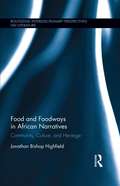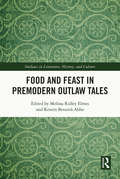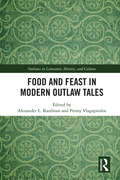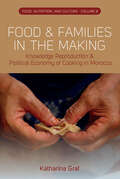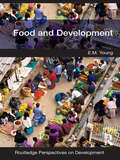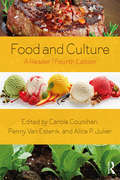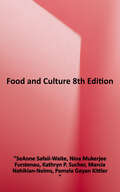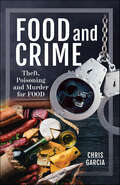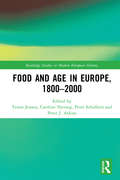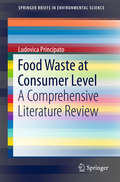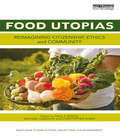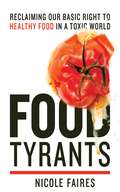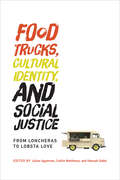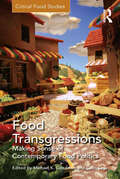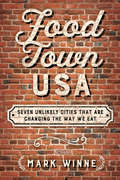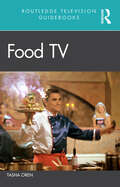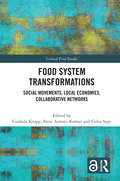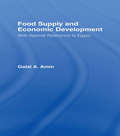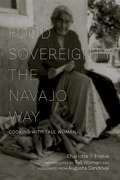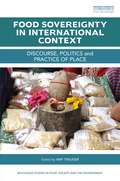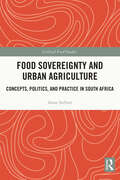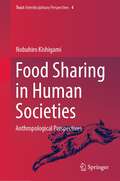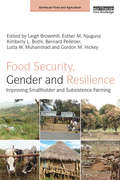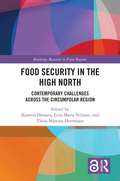- Table View
- List View
Food and Foodways in African Narratives: Community, Culture, and Heritage (Routledge Interdisciplinary Perspectives on Literature)
by Jonathan Bishop HighfieldFood is a defining feature in every culture. Despite its very basic purpose of sustaining life, it directly impacts the community, culture and heritage in every region around the globe in countless seen and unseen ways, including the literature and narratives of each region. Across the African continent, food and foodways, which refer to the ways that humans consume, produce and experience food, were influened by slavery and forced labor, colonization, foreign aid, and the anxieties prompted by these encounters, all of which can be traced through the ways food is seen in narratives by African and colonial storytellers. The African continent is home to thousands of cultures, but nearly every one has experienced alteration of its foodways because of slavery, transcontinental trade, and colonization. Food and Foodways in African Narratives: Community, Culture, and Heritage takes a careful look at these alterations as seen through African narratives throughout various cultures and spanning centuries.
Food and Festivals: India
by Mike HirstINDIA Let your mouth water and your tastebuds tingle as you find out all about Indian food and festivals in this book. Did you know that throwing rice at newlyweds comes from a tradition at weddings in India? Choose which gifts of candies you would like to receive at the festival of Diwali. Try the festival recipes inside to taste the flavor of INDIA.
Food and Feast in Premodern Outlaw Tales (Outlaws in Literature, History, and Culture #8)
by Melissa Ridley Elmes Kristin Bovaird-AbboIn Food and Feast in Premodern Outlaw Tales editors Melissa Ridley Elmes and Kristin Bovaird-Abbo gather eleven original studies examining scenes of food and feasting in premodern outlaw texts ranging from the tenth through the seventeenth centuries and forward to their cinematic adaptations. Along with fresh insights into the popular Robin Hood legend, these essays investigate the intersections of outlawry, food studies, and feasting in Old English, Middle English, and French outlaw narratives, Anglo-Scottish border ballads, early modern ballads and dramatic works, and cinematic medievalism. The range of critical and disciplinary approaches employed, including history, literary studies, cultural studies, food studies, gender studies, and film studies, highlights the inherently interdisciplinary nature of outlaw narratives. The overall volume offers an example of the ways in which examining a subject through interdisciplinary, cross-geographic and cross-temporal lenses can yield fresh insights; places canonic and well-known works in conversation with lesser-known texts to showcase the dynamic nature and cultural influence and impact of premodern outlaw tales; and presents an introductory foray into the intersection of literary and food studies in premodern contexts which will be of value and interest to specialists and a general audience, alike.
Food and Feast in Modern Outlaw Tales (Outlaws in Literature, History, and Culture)
by Penny Vlagopoulos Alexander L. KaufmanThis collection of scholarly essays presents new work from in an emerging line of inquiry: modern outlaw narratives and the textual and cultural relevance of food and feasting. Food, its preparation and its consumption, is presented in outlaw narratives as central points of human interaction, community, conflict, and fellowship. Feast scenes perform a wide variety of functions, serving as cultural repositories of manners and behaviors, catalysts for adventure, or moments of regrouping and redirecting narratives. The book argues that modern outlaw narratives illuminate a potent cross-cultural need for freedom, solidarity, and justice, and it examines ways in which food and feasting are often used to legitimate difference, create discord, and manipulate power dynamics.
Food and Families in the Making: Knowledge Reproduction and Political Economy of Cooking in Morocco (Food, Nutrition, and Culture #8)
by Katharina GrafEven in the context of rapid material and social change in urban Morocco, women, and especially those from low-income households, continue to invest a lot of work in preparing good food for their families. Through the lens of domestic food preparation, this book looks at knowledge reproduction, how we know cooking and its role in the making of everyday family life. It also examines a political economy of cooking that situates Marrakchi women’s lived experiences in the broader context of persisting poverty and food insecurity in Morocco.
Food and Development (Routledge Perspectives on Development)
by E. M. YoungThe relationship between food and development has always been controversial. Over the last thirty years, development in the north and south has failed to deliver people a decent diet. While some people have too little food and die as a consequence, some people have too much food and die from associated diseases. Furthermore, some methods of food production create social dislocation and deadly environments where biodiversity is eroded and pollution is rampant. While guaranteeing enough food for the world’s inhabitants continues to be a serious challenge, new issues about food have emerged. Food and Development is a lively and lucidly written text which provides a clear and accessible introduction to these complex and diverse food related problems. It explores the continued prevalence of mass under nutrition in the developing world; acute food crises in some places associated with conflict; the emergence of over nutrition in the developing world and the vulnerability of the contemporary global food production system. The text identifies the major problems and analyzes factors at international, national and local scales to understand their continued prevalence. The book concludes by evaluating the potential of some oppositional forces to challenge the hegemony of the contemporary food system. This timely and original text will be invaluable to undergraduates interested in the challenges surrounding food and development. The text is richly filled with case studies from the Global North and South to illustrate the nature and extent of these urgent issues and their interrelated nature. Each chapter contains a range of features to assist undergraduate learning, including: learning objective, key concepts, summaries, discussion questions, further reading and websites, and follow up activities.
Food and Culture: A Reader (Food In History And Culture Ser. #Vol. 1.)
by Carole Counihan Penny Van Esterik Alice JulierThis innovative and global best-seller helped establish food studies courses throughout the social sciences and humanities when it was first published in 1997. The fourth edition of Food and Culture contains favorite articles from earlier editions and several new pieces on food politics, globalism, agriculture, and race and gender identity.
Food and Culture, 8e
by Nina Mukerjee Furstenau SeAnne Safaii-Waite Kathryn P. Sucher Marcia Nahikian-Nelms Pamela Goyan KittlerProviding current information on the health, culture, food, and nutrition habits of the most common ethnic and racial groups living in the United States, Food and Culture supports human diversity and inclusivity and provides you with an accessible lens to see the connection. This market-leading text for cultural foods courses is also designed to help health professionals, chefs, and others in the food service industry learn to work effectively with members of different ethnic and religious groups in a culturally sensitive manner. It also will help you develop a grounded perspective of the diversity in the United States and enhance effective communication across cultures in any field of work. The authors include comprehensive coverage of key ethnic, religious and regional groups, including Native Americans, Europeans, Africans, Black Americans, Mexicans and Central Americans, Caribbean Islanders, South Americans, Chinese, Japanese, Koreans, Southeast Asians, Pacific Islanders, people of the Balkans, Middle Easterners, Asian Indians, and regional Americans.
Food and Crime: Theft, Poisoning and Murder for Food
by Chris GarciaAnyone alive, and wanting to stay that way, must deal with food. Crime is, and always has been, present. Food and Crime examines the crossroads of these two universal forces, how hunger can lead to theft, fraud, and murder, and how the well-fed will sometimes do anything to keep their bellies full. From the one-timers to the career caper-planners, food criminals are a wide-ranging, often audacious bunch, and this is the record of their impact, great and small. From a war fought by the Mayor of New York over tasty thistles, to the role McDonald's plays in the American culinary conscious, to how foreign food aid abuse led to a mighty fall in the financial sector, these sixteen stories of criminals who engage with the world of cuisine, cookery, or agriculture cover food and crime from the piddliest pilfering to the most diabolical murders. Covering the period from the Ancient Greeks (who invented insurance fraud) to the effects of COVID-19 on seafood crime in the true crime capital of America - Florida, here's clear evidence that there's never been a time when food and crime were not intimately entangled. Food and Crime sheds light on the unexpected, and sometimes unbelievable, connections between two things that we can never seem to get enough of.
Food and Age in Europe, 1800-2000 (Routledge Studies in Modern European History)
by Tenna Jensen Caroline Nyvang Peter Scholliers Peter J. AtkinsPeople eat and drink very differently throughout their life. Each stage has diets with specific ingredients, preparations, palates, meanings and settings. Moreover, physicians, authorities and general observers have particular views on what and how to eat according to age. All this has changed frequently during the previous two centuries. Infant feeding has for a long time attracted historical attention, but interest in the diets of youngsters, adults of various ages, and elderly people seems to have dissolved into more general food historiography. This volume puts age on the agenda of food history by focusing on the very diverse diets throughout the lifecycle.
Food Waste at Consumer Level: A Comprehensive Literature Review (SpringerBriefs in Environmental Science)
by Ludovica PrincipatoThis book presents what is the state-of-the-art in the field of the food waste phenomenon at consumer level, including a thorough literature review, and it highlights trends in the field. It provides a comprehensive starting point for future research. Food waste represents a major public policy issue, which is included in the UN Sustainable Development Goals. In this context, the present work identifies the most important definitions given to food waste and its environmental, social and economic impacts. With a comprehensive literature review that covers a forty-year time span (1977-2017), this book highlights the multiple, complex facets of food waste at the consumer level. Drawing from behavioural and marketing theories, it proposes a new theoretical framework with the aim to better explain food waste behaviour. Extensive research is being carried out on the main worldwide initiatives (both public and private) and food policies aimed at tackling the phenomenon.
Food Utopias: Reimagining citizenship, ethics and community (Routledge Studies in Food, Society and the Environment)
by Michael Carolan Christopher Rosin Paul V. StockFood is a contentious and emotive issue, subject to critiques from multiple perspectives. Alternative food movements – including the different articulations of local, food miles, seasonality, food justice, food knowledge and food sovereignty – consistently invoke themes around autonomy, sufficiency, cooperation, mutual aid, freedom, and responsibility. In this stimulating and provocative book the authors link these issues to utopias and intentional communities. Using a food utopias framework presented in the introduction, they examine food stories in three interrelated and complementary ways: utopias as critique of existing systems; utopias as engagement with experimentation of the novel, the forgotten, and the hopeful in the future of the food system; and utopias as process that recognizes the time and difficulty inherent in changing the status quo. The chapters address theoretical aspects of food utopias and also present case studies from a range of contexts and regions, including Argentina, Italy, Switzerland and USA. These focus on key issues in contemporary food studies including equity, locality, the sacred, citizenship, community and food sovereignty. Food utopias offers ways forward to imagine a creative and convivial food system.
Food Tyrants: Fight for Your Right to Healthy Food in a Toxic World
by Nicole FairesWhen author and homesteader Nicole Faires decided to retrofit an old school bus and tour America's small farms with her husband and two small children, she expected to learn a lot, be inspired, and have some fun. But what she fou
Food Trucks, Cultural Identity, and Social Justice: From Loncheras to Lobsta Love (Food, Health, and the Environment)
by Julian Agyeman Caitlin Matthews Hannah SobelAspects of the urban food truck phenomenon, including community economic development, regulatory issues, and clashes between ethnic authenticity and local sustainability.The food truck on the corner could be a brightly painted old-style lonchera offering tacos or an upscale mobile vendor serving lobster rolls. Customers range from gastro-tourists to construction workers, all eager for food that is delicious, authentic, and relatively inexpensive. Although some cities that host food trucks encourage their proliferation, others throw up regulatory roadblocks. This book examines the food truck phenomenon in North American cities from Los Angeles to Montreal, taking a novel perspective: social justice. It considers the motivating factors behind a city's promotion or restriction of mobile food vending, and how these motivations might connect to or impede broad goals of social justice. The contributors investigate the discriminatory implementation of rules, with gentrified hipsters often receiving preferential treatment over traditional immigrants; food trucks as part of community economic development; and food trucks' role in cultural identity formation. They describe, among other things, mobile food vending in Portland, Oregon, where relaxed permitting encourages street food; the criminalization of food trucks by Los Angeles and New York City health codes; food as cultural currency in Montreal; social and spatial bifurcation of food trucks in Chicago and Durham, North Carolina; and food trucks as a part of Vancouver, Canada's, self-branding as the “Greenest City.”ContributorsJulian Agyeman, Sean Basinski, Jennifer Clark, Ana Croegaert, Kathleen Dunn, Renia Ehrenfeucht, Emma French, Matthew Gebhardt, Phoebe Godfrey, Amy Hanser, Robert Lemon, Nina Martin, Caitlin Matthews, Nathan McClintock, Alfonso Morales, Alan Nash, Katherine Alexandra Newman, Lenore Lauri Newman, Alex Novie, Matthew Shapiro, Hannah Sobel, Mark Vallianatos, Ginette Wessel, Edward Whittall, Mackenzie Wood
Food Transgressions: Making Sense of Contemporary Food Politics (Critical Food Studies)
by Colin Sage Michael K. GoodmanReconnecting so-called alternative food geographies back to the mainstream food system - especially in light of the discursive and material 'transgressions' currently happening between alternative and conventional food networks, this volume critically interrogates and evaluates what stands for 'food politics' in these spaces of transgression now and in the near future and addresses questions such as: What constitutes 'alternative' food politics specifically and food politics more generally when organic and other 'quality' foods have become mainstreamed? What has been the contribution so far of an 'alternative food movement' and its potential to leverage further progressive change and/or make further inroads into conventional systems? What are the empirical and theoretical bases for understanding the established and growing 'transgressions' between conventional and alternative food networks? Offering a better understanding of the evolving position of the corporate food system vis a vis alternative food networks, this book considers the prospects for economic, social, cultural and material transformations led by an increasingly powerful and legitimated alternative food network.
Food Town, USA: Seven Unlikely Cities That are Changing the Way We Eat
by Mark WinneLook at any list of America's top foodie cities and you probably won't find Boise, Idaho or Sitka, Alaska. Yet they are the new face of the food movement. Healthy, sustainable fare is changing communities across this country, revitalizing towns that have been ravaged by disappearing industries and decades of inequity.What sparked this revolution? To find out, Mark Winne traveled to seven cities not usually considered revolutionary. He broke bread with brew masters and city council members, farmers and philanthropists, toured start-up incubators and homeless shelters. What he discovered was remarkable, even inspiring.In Bethlehem, Pennsylvania, once a company steel town, investment in the arts has created a robust new market for local restaurateurs. In Alexandria, Louisiana, "one-stop shopping” food banks help clients apply for health insurance along with SNAP benefits. In Jacksonville, Florida, aeroponics are bringing fresh produce to a food desert.Over the course of his travels, Winne experienced the power of individuals to transform food and the power of food to transform communities. The cities of Food Town, USA remind us that innovation is ripening all across the country, especially in the most unlikely places.
Food TV (Routledge Television Guidebooks)
by Tasha OrenThis book serves up an accessible, critical introduction to food television, providing readers with a solid foundation for understanding how culinary culture became pop culture via the medium of television. The book follows FoodTV’s journey from purely instructional resource to a wide variety of formats, from celebrity chef and restaurant profiles, to culinary travel and every manner of cooking competition from kids to cannabis. Tasha Oren traces the generic expansion of cooking on television as she argues for its development as a uniquely apt lens through which to observe and understand television’s own dramatic extension from network to cable to streaming platforms. She demonstrates how FoodTV became popular commercial television through its growth beyond instruction, response to industrial and cultural change, and a decisive turn away from an association with domesticity or femininity. The story of FoodTV offers a new understanding of how certain material, stylistic and textual practices that make up television emerge as conventions, and how such conventions both endure and evolve. This book is an ideal guide for students and scholars of media studies, television studies, food studies, and cultural studies.
Food System Transformations: Social Movements, Local Economies, Collaborative Networks (Critical Food Studies)
by Cordula KroppThis book examines the role of local food movements, enterprises and networks in the transformation of the currently unsustainable global food system. It explores a series of innovations designed to re-integrate sustainable modes of food production and encourage food sovereignty. It provides detailed insights into a specialised network of social actors collaborating in novel ways and creating new economic arrangements across different geographical locales. In working to devise ‘local solutions to global problems’, the initiatives explored in the book represent a ‘second-generation’ food social movement which is less preoccupied with distinctive local qualities than with building socially just food systems aimed at delivering healthy nutrition worldwide. Drawing on fieldwork undertaken in sites across Europe, the USA and Brazil, the book provides a rich collection of case studies that offer a fresh perspective on the role of grassroots action in the transition to more sustainable food production systems. Addressing a substantive gap in the literature that falls between global analyses of the contemporary food system and highly localised case studies, the book will appeal to those teaching food studies and those conducting research on civic food initiatives or on environmental social movements more generally.
Food Supply and Economic Development: with Special Reference to Egypt
by Galal A. AminFirst Published in 1966. Routledge is an imprint of Taylor & Francis, an informa company.
Food Sovereignty the Navajo Way: Cooking with Tall Woman
by Charlotte J. FrisbieAround the world, indigenous peoples are returning to traditional foods produced by traditional methods of subsistence. The goal of controlling their own food systems, known as food sovereignty, is to reestablish healthy lifeways to combat contemporary diseases such as diabetes and obesity. This is the first book to focus on the dietary practices of the Navajos, from the earliest known times into the present, and relate them to the Navajo Nation&’s participation in the global food sovereignty movement. It documents the time-honored foods and recipes of a Navajo woman over almost a century, from the days when Navajos gathered or hunted almost everything they ate to a time when their diet was dominated by highly processed foods.
Food Sovereignty in International Context: Discourse, politics and practice of place (Routledge Studies in Food, Society and the Environment)
by Amy TraugerFood sovereignty is an emerging discourse of empowerment and autonomy in the food system with the development of associated practices in rural and some urban spaces. While literature on food sovereignty has proliferated since the first usage of the term in 1996 at the Rome Food Summit, most has been descriptive rather than explanatory in nature, and often confuses food sovereignty with other movements and objectives such as alternative food networks, food justice, or food self-sufficiency. This book is a collection of empirically rich and theoretically engaged papers across a broad geographical spectrum reflecting on what constitutes the politics and practices of food sovereignty. They contribute to a theoretical gap in the food sovereignty literature as well as a relative shortage of empirical work on food sovereignty in the global "North", much previous work having focussed on Latin America. Specific case studies are included from Canada, Norway, Switzerland, southern Europe, UK and USA, as well as Africa, India and Ecuador. The book presents new research on the emergence of food sovereignties. It offers a wide variety of empirical examples and a theoretically engaged framework for explaining the aims of actors and organizations working toward autonomy and democracy in the food system.
Food Sovereignty and Urban Agriculture: Concepts, Politics, and Practice in South Africa (Critical Food Studies)
by Anne SiebertThis book analyses the interplay of urban agriculture and food sovereignty through the innovative lens of the "critical urban food perspective". It focuses on the mobilisation of urban food producers as a powerful response to highly exclusionary dynamics in the agri-food system including insufficient food access and disastrous land dispossessions. This volume particularly aims to fill the gap in the current literature by engaging with food sovereignty discourses and movements in urban areas. Related activism of urban food producers in the Global South remains underrepresented in practice and in literature. Therefore, this book engages with the lived realities of an urban agriculture initiative in George, South Africa. Building on theoretical notions of the "right to the city" and "everyday forms of resistance", the book illuminates how deprived food producers expose inequalities and propose alternatives. The findings of in-depth empirical research reveal that dwellers perceive farming as a mean to overcome historical segregation, high food prices, and unhealthy nutrition. Hence, they breathe life into food sovereignty in practice and suggest further alliances beyond the city. The book will be of interest to scholars and students of alternative food politics, agrarian transformation, and food movements as well as rural-urban intersections.
Food Sharing in Human Societies: Anthropological Perspectives (Trust #4)
by Nobuhiro KishigamiThis book explores why human beings share food with others using a humanistic anthropological approach. This book provides a comparative examination of distinct features and historical changes in food-sharing practices in various hunting-gathering societies, especially in the Inuit. The author considers human nature through various human food-sharing practices. Food sharing is a characteristic of human behavior and has been one of the central topics in anthropological studies of hunter-gatherers for a long time. While anthropologists have attempted to understand it in functional, historical, adaptational, social, cultural, psychological, or phenomenological perspective, they have failed to convincingly explain its origin, variation, existence or/and change. Recently, evolutionary ecology or behavioral ecology has dominated research of the topic. However, neither of them adequately considers social, cultural and historical factors in the analysis of human food-sharing practices. This book is an essential and fundamental study for every researcher interested in the relationship between human nature, society and culture.
Food Security, Gender and Resilience: Improving Smallholder and Subsistence Farming (Earthscan Food and Agriculture)
by Leigh Brownhill Esther Njuguna Kimberly L. Bothi Bernard Pelletier Lutta Muhammad Gordon M. HickeyThrough the integration of gender analysis into resilience thinking, this book shares field-based research insights from a collaborative, integrated project aimed at improving food security in subsistence and smallholder agricultural systems. The scope of the book is both local and multi-scalar. The gendered resilience framework, illustrated here with detailed case studies from semi-arid Kenya, is shown to be suitable for use in analysis in other geographic regions and across disciplines. The book examines the importance of gender equity to the strengthening of socio-ecological resilience. Case studies reflect multidisciplinary perspectives and focus on a range of issues, from microfinance to informal seed systems. The book’s gender perspective also incorporates consideration of age or generational relations and cultural dimensions in order to embrace the complexity of existing socio-economic realities in rural farming communities. The issue of succession of farmland has become a general concern, both to farmers and to researchers focused on building resilient farming systems. Building resilience here is shown to involve strengthening households’ and communities’ overall livelihood capabilities in the face of ongoing climate change, global market volatility and political instability.
Food Security in the High North: Contemporary Challenges Across the Circumpolar Region (Routledge Research in Polar Regions)
by Thora Martina Herrmann Kamrul Hossain Lena Maria NilssonThis book explores the challenges facing food security, sustainability, sovereignty, and supply chains in the Arctic, with a specific focus on Indigenous Peoples. Offering multidisciplinary insights with a particular focus on populations in the European High North region, the book highlights the importance of accessible and sustainable traditional foods for the dietary needs of local and Indigenous Peoples. It focuses on foods and natural products that are unique to this region and considers how they play a significant role towards food security and sovereignty. The book captures the tremendous complexity facing populations here as they strive to maintain sustainable food systems – both subsistent and commercial – and regain sovereignty over traditional food production policies. A range of issues are explored from food contamination risks, due to increasing human activities in the region, such as mining, to changing livelihoods and gender roles in the maintenance of traditional food security and sovereignty. The book also considers processing methods that combine indigenous and traditional knowledge to convert the traditional foods, which are harvested or hunted, into local foods. This book offers a broader understanding of food security and sovereignty, and will be of interest to academics, scholars, and policy makers working in food studies, geography and environmental studies, agricultural studies, sociology, anthropology, political science, health studies, and biology.
